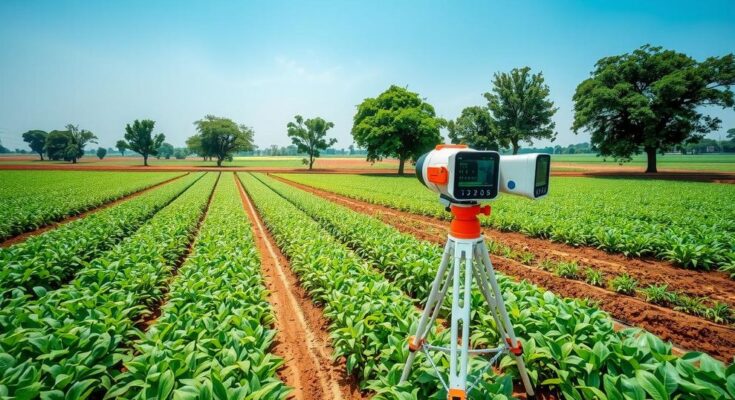Farmers in Nigeria are leveraging artificial intelligence to improve agricultural practices and increase yields. Technologies from local companies like Green Eden and Anatsor are enhancing monitoring systems to mitigate the adverse effects of climate change. However, challenges such as cost, internet access, and environmental impact remain significant obstacles in the adoption of these innovations.
In Nigeria, farmers like Dandam Nangor are enhancing agricultural practices through artificial intelligence. With simple smartphone applications, they can monitor greenhouse conditions, such as temperature and soil acidity, leading to significant increases in crop yields. Mr. Nangor reported a production increase of 20%, thanks to technology from local company Green Eden, which processes data collected from probes in the soil.
Agriculture remains a vital part of Nigeria’s economy, contributing approximately 20% of its GDP. However, farmers face challenges from climate change, particularly unpredictable rainfall patterns that threaten the majority of smallholders who lack irrigation systems. Stephanie Meltus, founder of Green Eden, highlighted that addressing the impact of climate change is crucial for the industry’s sustainability.
The agri-tech sector in Nigeria, particularly in cities like Jos, is evolving by fostering connections between technology and rural farming. Mercy Atsuku, a chicken farmer utilizing a monitoring system from the startup Anatsor, reported a decline in mortality rates in her flock since implementing the technology. It provides real-time updates on critical conditions, alleviating the need for constant manual checks.
However, the initial costs of such technology pose a barrier for some farmers, as observed by Ms. Atsuku, who found the $150 system expensive relative to local wages. As climate change escalates and urbanization continues to attract individuals away from farming, the urgency for effective agricultural solutions is more critical than ever.
Despite advancements, there are concerns regarding the focus of agri-tech developments. Critics argue that while output may increase, the sector needs to prioritize environmental sustainability. With only 40% of Nigerians having internet access—significantly lower in rural areas—many farmers remain unsupported. Moreover, challenges such as land degradation and inadequate infrastructure continue to impede progress.
The convergence of technology and agriculture in Nigeria offers promising pathways to mitigate the impacts of climate change, but significant barriers remain. Ensuring equitable access to technological advancements while addressing the environmental repercussions of farming practices is essential for the sector’s future.
Overall, as agricultural innovations gain momentum in Nigeria, they represent a crucial step towards enhancing productivity, though careful consideration of sustainability and accessibility is imperative.
Nigerian agriculture is undergoing a transformation with the integration of artificial intelligence, which assists farmers in monitoring and improving crop yields. While the potential for increased productivity is evident, challenges such as high costs, internet accessibility, and environmental sustainability must be addressed to fully capitalize on these advancements. The future of farming in Nigeria relies on a balanced approach that prioritizes innovation alongside ecological considerations.
Original Source: www.thehindu.com




